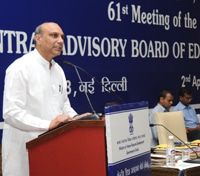Recently we had the former HRD Minister, Kapil Sibal, who is the current Minister of Communications and Information Technology, saying “I want public services to be delivered through Aakash. I want Aakash to be a platform for 1.2 billion people.” The initial versions of Aakash may have failed to elicit an enthusiastic response from the market, but the idea of low-cost tablets for education and other purposes has struck a chord with everyone. Kapil Sibal is right when he says that a affordable tablet like Aakash can also become a tool for providing public services in the nation.
saying “I want public services to be delivered through Aakash. I want Aakash to be a platform for 1.2 billion people.” The initial versions of Aakash may have failed to elicit an enthusiastic response from the market, but the idea of low-cost tablets for education and other purposes has struck a chord with everyone. Kapil Sibal is right when he says that a affordable tablet like Aakash can also become a tool for providing public services in the nation.
Aakash is just one example of a digital tool that holds great promises for the future of education in the country. It can greatly facilitate the acquisition and absorption of knowledge. Today education entrepreneurs have come up with a whole range of such solutions that provide unprecedented opportunities to enhance educational systems. The idea of “Digital Classrooms” where education is delivered through digital platforms has caught the imagination of the education community. They pose as a good strategy for engaging the digitalgeneration and improving individualised learning opportunities.
This issue of digitalLEARNING is focussed on the adoption of digital classrooms by the Indian institutions. We have interacted with a range of stakeholders to discover how the digital classrooms are re-orienting our school structures. We also take a look at the myriad challenges that the country faces as it tries to tailor its solutions around different institutions and their diverse learning needs. There are issues related to the training of the teachers in the digital technologies and there are also the budgetary constraints. But on thewhole the industry is doing well, and thanks to such technologies today students have access to an array of better educational opportunities.
We have included a guide in this issue of digitalLEARNING to help our institutions make the right choice when it comes to installation of digital classroom solutions in their campus.
This issue digitalLEARNING is a special edition, as it is a part of a series of two issues – April and May 2013 that are going to be launched at the World Education Summit (WES), scheduled for 23-24 April 2013, at Le Méridien,New Delhi. This would be the third edition of the WES, which is now widely regarded as the world’s premier platform for knowledge exchange. So we hope to have you there at this year’s WES, where large numbers of education leaders from around the globe are expected to gather. The conferences, exhibition, workshops and the award ceremony at the WES will provide a wonderful opportunity to stakeholders in the field of education, all over the world, to create opportunities of progress at all levels, namely – global, national, and regional.
The Digital Path to Future
eOdisha – Towards A Digital Economy
 |
 |
Chief Minister of Odisha, Shri Naveen Patnaik inaugurates the e-Odisha Summit
The revolution in Information and communications Technology (ICT) has brought a whole new agenda for governance into the realm of possibility. eGovernance, simply defined, is leveraging ICT solutions for transforming the reach and quality of the government’s service delivery. Being increasingly viewed as an enabler and facilitator of ‘good governance’, ICT widens the scope of good governance by including attributes such as a service-centric approach, citizen-centricity, anytime, anywhere delivery of services, integrated delivery of services, focus on outcomes, accountability, promoting right to nformation, and inclusion of disadvantaged communities.
It should come as no surprise, therefore, that ICT struck a timely chord with speakers and delegates and made the theme of the eOdisha conference held on 6th March, 2013 at Hotel Swosti Premium, Bhubaneswar in Odisha. The spotlight was on Odisha, the state playing the harbinger of a silent revolution in small towns and villages, acknowledging the IT initiatives and efforts in bringing about a digitally inclusive society.
The summit gave an opportunity to more than 500 participants, coming from governments, business and industry sector, academia, to create a level- sharing platform for easy exchange of knowledge and ideas in building and upgrading governance through ICT solutions, and build new visions of the future through good practice and case presentations.
eOdisha Summit 2013 was organised by Elets Technomedia under the patronage of Department of IT, Govt of Odisha and Odisha Computer Application Centre (OCAC). The eOdisha summit was designed and facilitated under the leadership of the Secretary IT, Department of IT in Odisha, Shri Madhusudan Padhi as the Program Chair.
Chief Minister of Odisha, Shri Naveen Patnaik inaugurated the e-Odisha summit. He was joined by the Guests of Honour, the then IT Minister of Odisha and also by R S Sharma. Director General and Mission Director of Unique Identity Authority of India (UIDAI).
The objectives of the eOdisha summit were to provide a platform to stakeholders in ICT to address regional issues and the challenges in the development sector; to highlight the regional perspectives and to draw the attention of concerned authorities towards addressing these challenges; to highlight best practices and deliberate on ways of replicating the same across different regions; and to expand and diversify the multiple stakeholder voices in order to make the state more dynamic and vibrant, thereby, incorporating issues of contemporary relevance.
Inaugurating the one-day e-Odisha summit, the Chief Minister of Odisha said the IT sector is at the top of the State Government’s agenda and Odisha is trying its best to be in the forefront of the IT revolution. It is a matter of pride that the IT exports from the State was more than `1600 crore during the year 2011-12 with a growth of 17 percent in comparison to the previous year. To accommodate future development in IT sector, particularly in Electronics System Design and Manufacturing (ESDM), the Government is developing one IT Investment Region (ITIR) in Bhubaneswar.
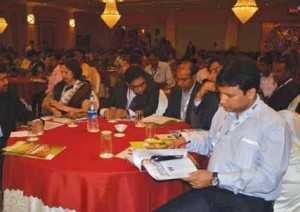 Amongst others, the opening ceremony was also joined by the then IT Minister of Odisha, the Director General and Mission Director of UIDAI (Unique Identity Authority of India), Secretary, Department of IT, Madhusudan Padhi, Ranbir Singh, Group Director, Government Affairs, Microsoft India and Dr Ravi Gupta, CEO, Elets Technomedia and Editor-in-Chief, egov magazine.
Amongst others, the opening ceremony was also joined by the then IT Minister of Odisha, the Director General and Mission Director of UIDAI (Unique Identity Authority of India), Secretary, Department of IT, Madhusudan Padhi, Ranbir Singh, Group Director, Government Affairs, Microsoft India and Dr Ravi Gupta, CEO, Elets Technomedia and Editor-in-Chief, egov magazine.
eOdisha Summit comprised of parallel thematic track conferences on IT and Governance, IT in Education, and IT in Health. It hosted discussions around themes including ‘Effective electronic service delivery’, ‘Urban governance & Infrastructure’, ‘ICT for inclusive framework for eGovernance’, ‘Application & Infrastructure security and public safety’, ‘Technology in healthcare’, and ‘Scope of technology in education and skill training’.
 The session on ‘Scope of Technology in Education & Skill training’ hold a fruitful discussion with some prominent panelists including Gagan Kumar Dhal, Principal Secretary, Dept of Higher Education, Odisha, Krushna Gopal Mahapatra, State Project Director, OPEPA, Dept. of School and Mass Education, Odisha, Prof Gopal Naik, Director, IIIT, Bhubaneshwar, Ratnakar Rout, Additional Secretary, Department of Employment and Technical Education & Training, Odisha, Lokesh Mehra, Director, Education Advocacy, Microsoft, and Ajay Krishnan, Director, Cisco Solutions.
The session on ‘Scope of Technology in Education & Skill training’ hold a fruitful discussion with some prominent panelists including Gagan Kumar Dhal, Principal Secretary, Dept of Higher Education, Odisha, Krushna Gopal Mahapatra, State Project Director, OPEPA, Dept. of School and Mass Education, Odisha, Prof Gopal Naik, Director, IIIT, Bhubaneshwar, Ratnakar Rout, Additional Secretary, Department of Employment and Technical Education & Training, Odisha, Lokesh Mehra, Director, Education Advocacy, Microsoft, and Ajay Krishnan, Director, Cisco Solutions.
eOdisha also presented three important components including active Conference, Exhibition, and Awards. Other than the active conferencing through thematic sessions, the eOdisha Awards platform recognised innovation and excellence in governance, education and healthcare. The awards were conferred in categories like eChampion of the State, Government to Business (G2B) Initiative, Government to Citizens (G2C) Initiative, ICT for Sustainable Development Initiative, ICT implementation in Public Sector Unit, ICT Initiative for Urban Development, ICT enabled School, ICT enabled Higher Education Institute/University in Odisha, ICT in education initiative by Government in Odisha, ICT in healthcare initiative and more.
| Scope of Technology in Education and Skills Training :: |
 |
Gagan Kumar Dhal, Principal Secretary, Department of Higher Education, Government of Odisha We are keen on digitising the libraries in the state so that there can be proper accounting of the journals, which are purchased and the students will be able to access them. We are coming up with a very comprehensive scheme for the same purpose. |
 |
Gopal Mahapatra, Director, School and Mass Education Department, Government of Odisha Every year we carry out a survey called District Information System for Education, which is essential to plan for the children belonging to the state. We get to know the requirement of teachers,infrastructural requirements, and requirement of text books. Around 65,000 schools across the state are monitored through our CRC, BRC and other. We monitor the performance of the schools broadly on four points, viz, infrastructure, curricular activities, extracurricular activities, and school community linkage. We analyse the performance of schools from all the 30 districts and the blocks too. We also have a student’s helpline number for the grievance redressal. |
 |
Ratnakar Rout, Additional Secretary, Employment and Technical Education & Training, Government of Odisha We have 630 ITI s and ITC s. We used to have manual registration of students till 2010. We introduced online registration in the year 2011 and were partly successful. In the year 2013, we have achieved 100 percent online registration during. Around 55990 students have registered their names through online procedure. Despite a lot of obstruction, we have introduced online JEE in Odisha. The counseling of students was done via online since last year and this year we have outsourced the service to an IT company. Odisha has around 100 engineering colleges, 100 polytechnic schools. We have observed that, there is dearth of technically qualified people in the government institutions and suitable people are not available to fill up the vacancies. |
 |
Lokesh Mehra, Director, Education Advocacy, Microsoft The government is focusing a lot on the development of the education sector. This sector has been allotted an increased budget of 17 percent.As we are progressing towards a virtual education system, the concepts of time and place changes leading to an alteration of the entire paradigm. By the year 2025, there will be 47 million youths and there should be 52 million job opportunities to employ everyone. There is a common complain that the industries do not come forward. However, the truth is that industries operate in silos. Some people prefer to go and deliver a guest lecture, some of them allow students to visit them, and some of them will come forward and donate equipment. Also, as far as the curriculum is concerned, the board of study sits twice or thrice a year. So the curriculum is not updated often. |
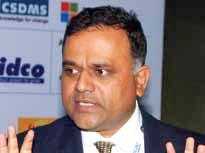 |
Ajay Krishnan, Director, Cisco Solutions In order to bring about inclusive growth, we focus on three areas, viz, education, skills development and healthcare. We have used technology to solve the issue of lack of teachers in the schools. Through video conferencing, we have brought teachers to the class rooms which are located far away in the rural areas of Karnataka. There are 2000 students studying in classes 5, 6, 7 and 8 are learning through this medium. We have seen that will minimum usage of technology, education can be made to reach a large group of people. In a similar way, we have connected engineering students to a group of Indian Institute of Science professors. |
In talks with IITs for better quality of higher education: Goa CM
PORVORIM: Chief Minister Manohar Parrikar said that the government is in talks with IITs to come up with a better system to enhance the quality of higher education and to bring in a good teaching faculty.
He also said that new proposals would be introduced to raise the quality of education in institutes like the Goa Engineering College ( GEC), Farmagudi, and the Goa Medical College ( GMC), Bambolim.
Parrikar, who also holds the education portfolio, made the declaration while responding to points raised by members participating in the discussion on demands on Thursday.
He said the plan is to invite special professors to create an interest in subjects taught in engineering and medical colleges. But colleges should also put in more efforts to widen the wisdom of students.
As regards to granting an extension in the retirement age of teachers of higher education, he said it cannot be done for general teaching staff as even teachers who do not teach well will get the benefit. Granting an extension in the retirement age was being considered due to the high ratio vacancies.
As a way out, he said the extension in the retirement age could be granted, subject to a recommendation from the respective college. He said the proposal has been sent to the Goa University.
Referring to the demand for increasing seats of engineering and medical colleges, he said it was during his tenure that seats of both the engineering colleges in the state had increased from 430 to 900.
Planning Commission to hold first ‘Hackathon’ on 12th FYP
 Planning Commission and National Innovation Council (NIC) have jointly decided to hold a two-day hackathon on the 12th Five Year Plan on April 6-7.
Planning Commission and National Innovation Council (NIC) have jointly decided to hold a two-day hackathon on the 12th Five Year Plan on April 6-7.
As per the statement, the hackathon will last for 32 hours during which participants from all over the country will gather in teams to compete for interesting prizes, classified under three categories – mobile/web applications, infographics and short films.
Hackathon will be organised simultaneously in 11 locations across the country for computer programmers and others collaborate on software projects. Those interested in may join it virtually. Few hackathons will also be intended towards educational or social purposes.
The hackathon would allow young creative designers, coders, film-makers and policy and development enthusiasts to visualise and narrate the 12th Plan through the modes of infographics, short films, and support the initiatives proposed in the Plan.
The event is scheduled to take place at University of Jammu, IIT Delhi, Delhi University, Aligarh Muslim University, IIT Kanpur, IIT Kharagpur, TISS Mumbai, IIIT Hyderabad, IISc Bangalore, IIT Madras and IIM Shillong.
Need Expansion, Equity and Excellence in Education: Pallam Raju
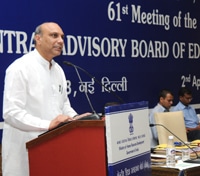 NEW DELHI: HRD Minister MM Pallam Raju stressed on the need to focus on expansion, equity and excellence in education in the Central Advisory Board of Education (CABE).
NEW DELHI: HRD Minister MM Pallam Raju stressed on the need to focus on expansion, equity and excellence in education in the Central Advisory Board of Education (CABE).
Pallam Raju laid special emphasis on the need of combined effort from central and state governments, academics and autonomous institutes to come together and work towards the betterment of the country’s education.
Raju was addressing the state education ministers, university vice-chancellors, heads of different education boards and academicians at the 61st Meeting of the Central Advisory Board of Education (CABE), highest decision making’ body in the field of education.
The meeting reviewed the implementation of the Right to Education and ICT in higher education. Discussion was held on the education commission proposed by Prime Minister Manmohan Singh during his speech on Independence Day in 2011.
Other discussions were held around the topics of Best practices in implementation of school sanitation and hygiene education; Elimination of gender and social gaps in school enrolment and retention, Review of implementation of RTE, etc.
Rajasthan fails to spend grants for ICT in schools: National survey
JAIPUR: A national survey has now found that the state of Rajasthan has performed poorly in terms of utilisation of Central education grants. The state education department has failed to spend Rs 16.23 crore of the Rs 20 crore grant received under the centrally sponsored information and communication and technology (ICT) in schools in 2009. It also failed to utilize funds of Rs 5 crore sanctioned for ‘inclusive’ education for the disabled at the secondary stage (IEDSS) in the state.
The depressing level of fund utilization in the state was pointed out in a recent nationwide school education survey (8th) conducted by the National Council of Educational and Research Training ( NCERT). The status report was released by the Union ministry of human resources and development in January 2013. The centrally sponsored ICT scheme in schools was launched in December 2004 and revised in 2010 for Rajasthan.
Under the scheme, the state gets financial assistance to procure computers and other ICT-related infrastructure. The grant of Rs 6.4 lakh (non-recurring) and Rs 2.7 lakh (recurring) per school is given, which is shared between the Centre and state in a ratio of 3:1. Of the Rs 20 crore released by the Centre for the state, only Rs 4.77 crore has been utilized till date. Piling on more embarrassment, the state has also failed in issuing 25% of its share for the project.
Similarly, the Central government released Rs 5 crore during the 11th Five Year Plan for IEDSS. But here too, the amount remained unutilised. To cover up its inability, the state has not submitted the audit report to the Centre.
The report further indicates that no proposal under the scheme has been received from the state for year 2012-13. The apathy of the government shows large on the decline in enrolment of girls with disabilities in schools in the state.
Rajasthan recorded the second lowest literacy rates in rural areas at 54%, just a per cent better than Bihar. Literacy level among the urban population is 73%, a tad better than Uttar Pradesh which ranked lowest with 70%.
Children have right to quality education: Bombay high court
 MUMBAI: Children have the right not only to free education, but also to choose a school that provides quality education, the Bombay high court has stated.
MUMBAI: Children have the right not only to free education, but also to choose a school that provides quality education, the Bombay high court has stated.
A division bench of Chief Justice Mohit Shah and Justice Nitin Jamdar on Thursday ruled that the government would have to reimburse private unaided schools for the educational expenses of students belonging to SC/ST and other disadvantaged categories.
The presence of government/civic primary schools cannot be the grounds to deny children of weaker sections their right to choose elementary school providing satisfactory quality of education, said the bench. It is clear from the statement of objects and reasons to the Right To Education Act that children from disadvantaged sections are not merely entitled to free and compulsory education but also to free elementary education of ‘satisfactory quality’. If state/civic schools provide education of satisfactory quality, children would not have to go to private unaided schools, the bench adds.
The court asked the state to reimburse for education expenses of SC/ST children from the academic year of 2010-2011; it has stated that an annual amount of Rs 10,463 should be paid for every ClassI-IV child and Rs 25,581 for those in Class V to VIII, or the actual fee, whichever is less, irrespective of parents’ income. Schools will also be reimbursed similar amounts for kids of vimukta jaati notified tribes (VJNT), other backward classes (OBC) and special backward classes (SBC), if their parents earn less than Rs 1 lakh per annum. For every SC/ST kids of Classes IX and X (irrespective of parents’ income) and VJNT/OBC/SBC students of Class I-X, whose parents earn Rs 1-4.5 lakh, Rs 100-Rs 350 will be paid.
The court’s decision came on a public interest litigation filed by parents of children who were barred from attending schools as the state had not reimbursed the expenses to the institutions. The state had opposed the petition on the grounds of the financial burden on the public exchequer and asked the court to exclude the creamy layer from the scheme.
Continuous Evaluation System give way to poor education: Himachal CM
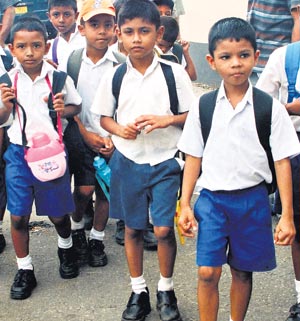 SHIMLA: The Himachal Pradesh Assembly requested the central government to give consent to the state’s decision to carry out board examinations of elementary classes until a well-organized evaluation system is put in place.
SHIMLA: The Himachal Pradesh Assembly requested the central government to give consent to the state’s decision to carry out board examinations of elementary classes until a well-organized evaluation system is put in place.
This decision moved by Chief Minister Virbhadra Singh, who is also in charge of the education portfolio, stirred up positive response from officials of other parties. According to the chief minister, the process of continuous evaluation system has given way to poor educational standards.
As a result the students are not serious about their classes, in the primary and secondary standards and teachers too have responded casually to the situation. The Chief Minister recommended the Union Government to amend the Right of Children to Free and Compulsory Education Act, 2009.
Center relaxes teachers’ recruitment norms in 13 states
 NEW DELHI: The central government has accepted the plea of the 13 states that sought relaxation of the minimum qualification criteria for teachers’ recruitment under the Sarv Shiksha Abhiyan.
NEW DELHI: The central government has accepted the plea of the 13 states that sought relaxation of the minimum qualification criteria for teachers’ recruitment under the Sarv Shiksha Abhiyan.
The states that had filed the plea are: Assam, Manipur, Meghalaya, Nagaland, Tripura, Bihar, Chhattisgarh, Himachal Pradesh, Madhya Pradesh, Odisha, Uttarakhand, Uttar Pradesh and West Bengal.
Human Resource Development Ministry notified that the relaxation in the recruitment process was sought for as the respective states failed to get teachers possessing the minimum qualifications as laid down by the National Council for Teacher Education under the Right of Children to Free and Compulsory Education Act, 2009.
The government has sanctioned over Rs.6, 300 crore to ensure strengthening of teacher education in the 12th Plan, the ministry marked in its statement.
In addition to this, the National Council for Teacher Education (NCTE) has allowed the states to offer training to over five lakh in-service untrained teachers through distance mode.
The amended scheme would promote setting up of new District Institutes of Education and Training (DIETs), Colleges of Teacher Education (CTEs) and Institutes of Advance Study in Education (IASEs).
Sarva Shiksha Abhiyan records sanction of 19.82 lakh teachers to states and union territories against 12.86 lakh teachers who were recruited till December 2012.
GTU approves 85 new engineering branches in state
 AHMEDABAD: Thirty five branches of engineering, including 22 branches of Electronics and Communication have been cancelled by Gujarat Technological University (GTU).
AHMEDABAD: Thirty five branches of engineering, including 22 branches of Electronics and Communication have been cancelled by Gujarat Technological University (GTU).
Conversely, 85 new engineering branches have been started in the state. The newly approved branches are of Masters of Engineering (ME).
A total budget of Rs 184 crore was passed during a meeting of the GTU Board of Governors . The university also decided upon five new centres of excellence. However, the locations of these centres are yet to be finalised.
The centres of excellence would strive to focus on research activities with the aim to bridge the industry academia gap in the university.
GTU also introduced number mechanical engineering branches to mobilize better job prospects in the industry.










